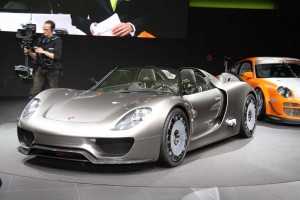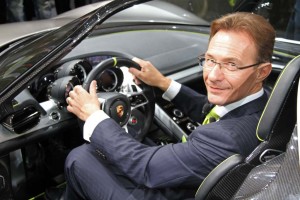
The plug-in powertrain in the Porsche 918 Spyder Concept could see production, possibly in a Boxster, within a couple years.
Look for Porsche to put its first plug-in hybrid into production something during the 2013 model-year, the sports car maker’s CEO told TheDetroitBureau.com during a conversation at the 2010 Geneva Motor Show.
The lithium-ion based system is making its debut on the Porsche 918 Spyder Hybrid concept, one of three different hybrid offerings gracing the German maker’s stand at this year’s Geneva show. What’s particularly significant is Porsche’s use of three different hybrid technologies, one for each of the models debuting at PALExpo.
That includes a “full” hybrid system that will debut in the second-generation Porsche Cayenne SUV, which launches next autumn. The Cayenne will be able to drive for brief distances – at speeds of up to 98 mph – solely on battery power, but like other current hybrid systems, it is intended to run primarily on a mix of battery and gasoline power.

Porsche CEO Michael Macht sees hybrids accounting for as much as 30% of the maker's volume by the latter part of the decade.
Not so the plug-in technology beneath the skin of the 918 Spyder Concept which, as TheDetroitBureau.com earlier reported, is being introduced in Geneva. The unusual system relies on a high-performance gasoline engine linked into a complex drivetrain featuring a pair of electric motors driven by two electric motors, one for each axle. The package will go for roughly 30 miles on battery power alone, but in track mode, the collective power sources can launch the Porsche 918 Spyder Concept from 0 to 100 kmh (0 – 62.5 mph) in just 3.2 seconds. But fuel economy is an estimated 78 mpg.
“We’ll decide whether to put this (hybrid system) into production in the next couple months,” Porsche CEO Michael Macht explained in an interview following Porsche’s news conference. In further discussion, however, it became clear that the maker is moving ahead as if it has already given the green light.
Macht acknowledged that Porsche – like other luxury and performance car manufacturers, has to be responsive to tightening emissions and fuel economy legislation, around the world. He also believes Porsche buyers want the company to move in that direction.
“This way, you can go very fast and it still would be socially acceptable,” the CEO said.
Where the plug-in system will first be used is unclear, but Macht acknowledged that a very strong candidate is the Porsche Boxster. The 911 would be another option, he added.
Production, said the Porsche chief executive, could begin “in two to three years” after the project gets final approval.
Along with the Cayenne and 918 Spyder hybrid systems, Porsche also revealed a flywheel-driven hybrid that was developed specifically for the 911 GT3 R Hybrid race car. Use on the street is considered highly unlikely, however.
But there’s little doubt, that electric propulsion, in one form or another, “will be very important in the future,” stressed Macht, concluding that hybrids will account for about 15% of global sales for the new Cayenne. Longer-term, he predicted hybrids could be the powertrain of choice for as much as 30% of Porsche buyers.
